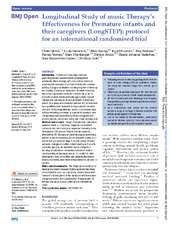| dc.contributor.author | Ghetti, Claire | |
| dc.contributor.author | Bieleninik, Lucja | |
| dc.contributor.author | Hysing, Mari | |
| dc.contributor.author | Kvestad, Ingrid | |
| dc.contributor.author | Assmus, Jörg | |
| dc.contributor.author | Romeo, Renee | |
| dc.contributor.author | Ettenberger, Mark | |
| dc.contributor.author | Arnon, Shmuel | |
| dc.contributor.author | Vederhus, Bente Johanne | |
| dc.contributor.author | Gaden, Tora Söderström | |
| dc.contributor.author | Gold, Christian | |
| dc.date.accessioned | 2020-08-12T08:49:12Z | |
| dc.date.available | 2020-08-12T08:49:12Z | |
| dc.date.issued | 2019 | |
| dc.Published | Ghetti C, Bieleninik L, Hysing M, Kvestad I, Assmus J, Romeo R, Ettenberger, Arnon, Vederhus BJ, Gaden TSG, Gold C. Longitudinal study of music therapy's effectiveness for premature infants and their caregivers (LongSTEP): Protocol for an international randomised trial. BMJ Open. 2019;9:e025062 | eng |
| dc.identifier.issn | 2044-6055 | eng |
| dc.identifier.uri | https://hdl.handle.net/1956/23673 | |
| dc.description.abstract | Introduction: Preterm birth has major medical, psychological and socioeconomic consequences worldwide. Music therapy (MT) has positive effects on physiological measures of preterm infants and maternal anxiety, but rigorous studies including long-term follow-up are missing. Drawing on caregivers’ inherent resources, this study emphasises caregiver involvement in MT to promote attuned, developmentally appropriate musical interactions that may be of mutual benefit to infant and parent. This study will determine whether MT, as delivered by a qualified music therapist during neonatal intensive care unit (NICU) hospitalisation and/or in home/municipal settings following discharge, is superior to standard care in improving bonding between primary caregivers and preterm infants, parent well-being and infant development. Methods and analysis: Design: international multicentre, assessor-blind, 2×2 factorial, pragmatic randomised controlled trial; informed by a completed feasibility study. Participants: 250 preterm infants and their parents. Intervention: MT focusing on parental singing specifically tailored to infant responses, will be delivered during NICU and/or during a postdischarge 6-month period. Primary outcome: changes in mother–infant bonding at 6-month corrected age (CA), as measured by the Postpartum Bonding Questionnaire. Secondary outcomes: mother–infant bonding at discharge and at 12-month CA; child development over 24 months; and parental depression, anxiety and stress, and infant rehospitalisation, all over 12 months. Ethics and dissemination: The Regional Committees for Medical and Health Research Ethics approved the study (2018/994/REK Nord, 03 July 2018). Service users were involved in development of the study and will be involved in implementation and dissemination. Dissemination of findings will apply to local, national and international levels. | en_US |
| dc.language.iso | eng | eng |
| dc.publisher | BMJ | eng |
| dc.relation.uri | https://bmjopen.bmj.com/content/9/8/e025062.info | |
| dc.rights | Attribution-NonCommercial CC BY-NC | eng |
| dc.rights.uri | http://creativecommons.org/licenses/by-nc/4.0/ | eng |
| dc.title | Longitudinal study of music therapy's effectiveness for premature infants and their caregivers (LongSTEP): Protocol for an international randomised trial | eng |
| dc.type | Peer reviewed | |
| dc.type | Journal article | |
| dc.date.updated | 2019-11-23T07:46:08Z | |
| dc.description.version | publishedVersion | |
| dc.rights.holder | Copyright 2019 The Author(s) | eng |
| dc.identifier.doi | 10.1136/bmjopen-2018-025062 | eng |
| dc.identifier.cristin | 1721053 | |
| dc.source.journal | BMJ Open | |
| dc.relation.project | Norges forskningsråd: 273534 | |

